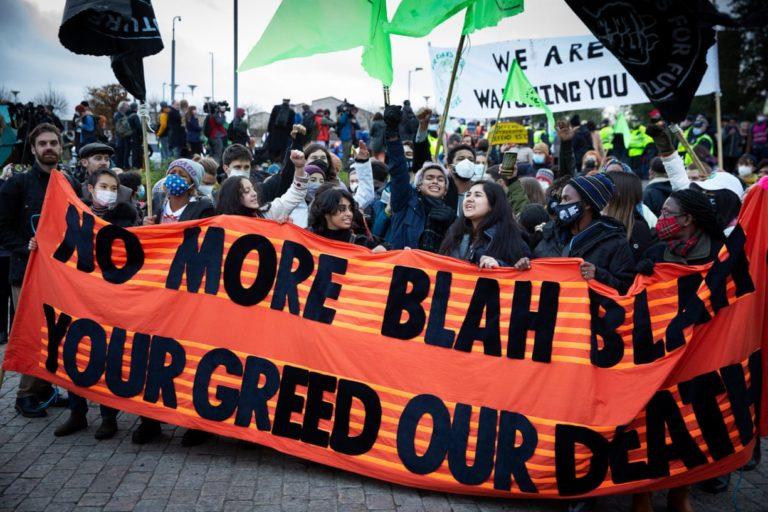Glasgow Climate Summit is an Elite Farce

Protestors at the venue of Glasgow summit on climate change
The Glasgow summit on climate change has been a media extravaganza. The ruling elites from all continents cooped up in their national capitals due to the raging pandemic, finally got a break to throw away their masks and take to their private jets to fly off to “Global Britain” to display their leadership qualities.
There are some noble exceptions of course — such as Kiribati, Marshall Islands, Tuvalu, etc. which are predominantly low-lying atolls, rising just metres above the waves, who are the world’s moral conscience on climate change. But obscene grandstanding was the leitmotif of the two-day event in Glasgow. They came as if to party, exult in backslapping and enjoy themselves while taking care to impress their domestic audiences that their personalised politics would translate as gains for their countries.
Of course, the two star performers were the UK Prime Minister Boris Johnson and the US President Joe Biden. For Johnson, the impressive attendance of almost 100 world leaders served to proclaim that Britain is back in the first league of nations, having successfully survived the Brexit.
For the US president Joe Biden, it has been a more complicated story. He had the twin mission of reasserting America’s ability to lead the world as well as to draw synergy out of the summit for himself politically at a juncture when the coalition that propelled Democrats to power and himself to the presidency in 2020 seems to have collapsed and there are growing doubts within the party about his ability to push his domestic agenda across the finish line.
The Glasgow summit witnessed a lack of consensus among world leaders on how to move forward globally on climate change. They presented competing ideas but on core issues there was no consensus — such as the rich countries redeeming their pledge to help poor countries pivot away from fossil fuels.
In Copenhagen, at COP15 in 2009, countries came together and said they would provide $100 billion per year and would reach that target by 2020. They abysmally failed to meet the target. Arguably, in many ways the success of the Glasgow summit will depend on the issue of financial support.
The only tangible outcomes at Glasgow are the two agreements to reduce methane gas emissions and protect the world’s forests. These are low-hanging fruits but are nonetheless two most effective strategies to keep the goal of limiting warming to 1.5˚C within reach while yielding co-benefits including improving public health and agricultural productivity.
Over 100 countries representing over 40% of global methane emissions and over two thirds of global GDP are on board The Global Methane Pledge launched on Tuesday in Glasgow, which is a collective effort to reduce global methane emissions at least 30% from 2020 levels by 2030, which could eliminate over 0.2˚C warming by 2050.
However, there were notable absentees from those signing on, including some major methane polluters like China, Russia, Australia and India.
Again, more than 100 countries pledged on Tuesday to end deforestation by 2030, agreeing to a sweeping accord aimed at protecting some 85% of the world’s forests. There is no gainsaying the fact that the accord is crucial to absorbing carbon dioxide and slowing the rise in global temperatures.
Again, India happens to be among the countries that dissociated from the accord on curbing deforestation.
But Prime Minister Narendra Modi in his statement made some sensational announcements. The five pledges Modi made are that India will:
- increase non-fossil energy capacity to 500 GW by 2030;
- meet 50% of energy requirements from renewable energy by 2030;
- reduce the total projected carbon emissions by one billion tonnes from now to 2030;
- reduce by 2030 the carbon intensity of the economy by 45% (from the previous target of 35%); and,
- achieve the net-zero target by 2070.
Taken together, this will pose a gigantic transformation of India’s climate commitment through the next eight-year period but will involve huge mobilisation of resources. The noted expert on climate change Sunita Narain aptly used a metaphor to estimate that Prime Minister Narendra Modi has assumed an impossible challenge of “not just walking the talk but running it”.
An International Energy Agency report in February titled India Energy Outlook 2021 estimates that the country will need to spend an additional $1.4 trillion to adopt clean energy technologies and be on a sustainable trajectory over the next twenty years. The investment is around 70% higher than what the government had envisaged. The report noted that the transformation would require massive advances in innovation, strong partnerships and vast amounts of capital.
Only few countries have dared to put their carbon reduction path in such terms in the near term, as Modi has done. Certainly, no country from the industrialised world has done it! Are we shooting ourselves on the foot by wanting to be one up on China? Who are we trying to impress? There are no easy answers.
Besides, as Narain noted, Modi’s announcement quintessentially means that India is capping future growth in the coal industry. “The big issue will be to ensure that growth is equitable, and the poor are not denied their right to development in this energy future. As we set out ourselves the goal to grow without pollution, we must work on increasingly clean, but affordable, energy for the poor,” Narain wrote.
Finally, the target of net-zero by 2070. What is intriguing is that as recently as on October 28, India had rejected calls to announce a net zero carbon emissions target and maintained that it was more important for the world to lay out a pathway to reduce such emissions.
The environment secretary R.P. Gupta told reporters in Delhi, “It is how much carbon you are going to put in the atmosphere before reaching net zero that is more important.”
But by November 1, India did an extraordinary volte-face by announcing at Glasgow that 2070 is the target for India to reach net zero carbon emissions. The zest to make dramatic announcements before an elite world audience probably got the better of our judgment.
The Russian presidential envoy on climate issues Ruslan Edelgeriyev characterised the Glasgow summit as a “race of ambitions”. He told Tass that the ambitious goals of some countries are “not underpinned by (clear) roadmaps and scientific data” and are based on “unjustified hopes for the emergence of new technologies.”
Russia recently assumed 2060 as its net zero target, basing its decision on “scientific evidence and calculations.” But Edelgeriyev said that reaching the net zero target even before 2060 is possible, provided a “favourable domestic and international environment” is available. He cited the Western sanctions against Russian state-owned corporations. Besides, there are obstacles such as the opposition to declare nuclear power as a low carbon source of energy.
Russia hosts about 20% of the total area of global forests, and thus it fully supports the Glasgow declaration on forests and land use. But Russia would have liked also to consider forestation as valid “green projects” to offset CO2 emissions.
MK Bhadrakumar is a former diplomat. He was India’s ambassador to Uzbekistan and Turkey. The views are personal.
Get the latest reports & analysis with people's perspective on Protests, movements & deep analytical videos, discussions of the current affairs in your Telegram app. Subscribe to NewsClick's Telegram channel & get Real-Time updates on stories, as they get published on our website.
























